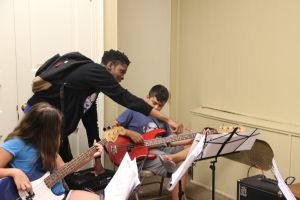With constant budget cuts being established for schools, music programs are suffering. The Huffington Post found that there is a lack of music education programs due to the loss of funding. This causes students to be less engaged and attracted to their schools’ music programs. Little do people know, music in schools and education of music has many benefits for students both inside and outside of the classroom.

Some benefits to exposing students to music education would include helping students to develop their languages.
“While children come into the world ready to decode sounds and words, music education helps enhance those natural abilities,” Mary Luehrisen, executive director of the National Association of Music Merchants, said. It has been proven to show that “growing up in a musically rich environment is often advantageous for children’s language development.”
In a music education setting, students are able to expand parts of their brains which allows them to grasp more. Along with enhancing language skills, music education also increase memory and coordination skills as well as a way to enhance their learning skills and work ethic.
According to the National Association of Music Education, studies have shown that, “even when performing with sheet music, student musicians are constantly using their memory to perform.” This can lead to students improving their skills for both inside and outside of schools. Music education allows students to grasp more skills that they continue to use and even help to make students more engaged in school.
Music education has also been proven to attract more students into their school environment. The National Association of Music Education has also discovered that, “schools that have music programs have an attendance rate of 93.3 percent compared to 84.9 percent in schools without music programs.” With the increase of the attendance in schools, it leads to students improving their work because they are being focused and attending school.

“Playing an instrument (more so than just listening to music) is a workout for our brains.” According to Instruments of Joy, “it builds academic achievement by strengthening the areas of cognitive performance.” When students realize they have done something that can be considered challenging, such as learning an instrument or learning how to read music, it gives them a sense of accomplishment and enhances their desire to accomplish more. With that in mind, when students reach their goals and feel motivated, they tend to have more confidence and higher self esteem with everything they do. This ultimately shapes students into what kind of people they want to be as adults and what they want to do.

Ultimately, learning an instrument or even just music education in general has many benefits for students. Investing in music education could potentially make students more confident in what they do, attract them to learning and even push them to enhance their knowledge. Thus, budgets should be focused more on enhancing music programs because these creative learning environments essentially enhance the students.


